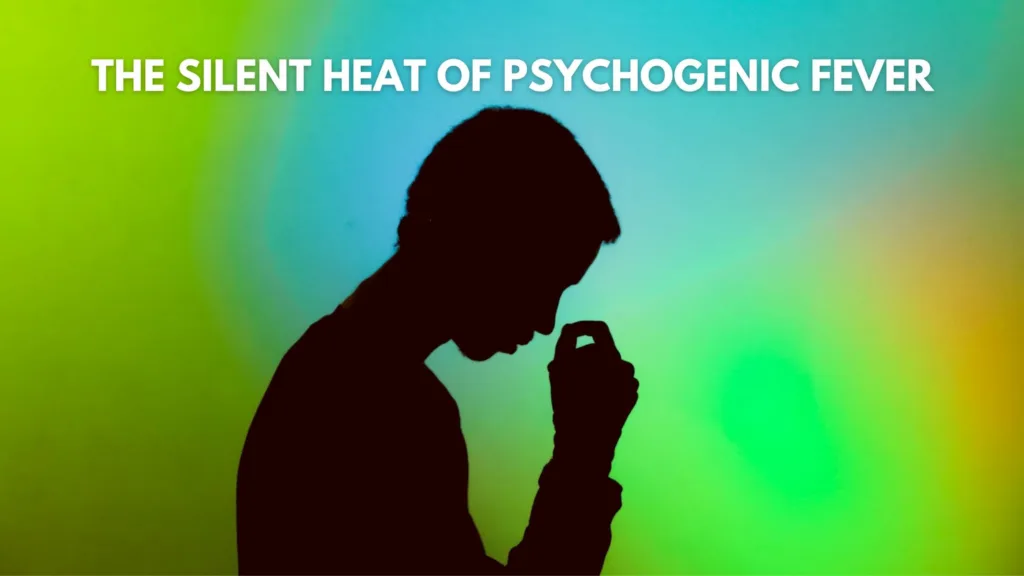In the world of medicine, doctors have always wondered how our emotions connect with our physical health. One fascinating example of this is psychogenic fever. It’s like when our bodies heat up, but there’s no illness causing it. Sometimes, doctors might not catch this because it’s tricky to notice. But learning about psychogenic fever shows us just how big of a role our feelings can play in our well-being.
What is Psychogenic Fever?
Psychogenic fever happens when a person’s body gets hotter because of their emotions, like feeling really stressed or anxious, rather than because of a sickness like a cold or flu. For example, imagine someone is extremely worried about an important test at school. Their body might react to that stress by getting a bit hotter, even though they’re not actually sick with a virus or anything. So, psychogenic fever is like a fever caused by feelings instead of germs.
Symptoms and Presentation
- People with a psychogenic fever feel like they have a regular fever.
- They might feel hot, sweaty, shivery, and tired.
- Doctors check them but can’t find signs of the usual sickness that causes fevers.
- Their heart rate and blood pressure are often normal, even though they feel feverish.
- It’s like their body thinks it’s sick, but there’s no real sickness causing the fever.

Mechanisms Underlying Psychogenic Fever
- Feeling Stressed: When someone feels really stressed, their body’s stress response system kicks into gear.
- Hormone Release: This system releases hormones like cortisol, which is like a stress signal in the body.
- Temperature Control: Cortisol can mess with how the body controls its temperature, making it think it’s hotter than it really is.
- Nervous System Impact: Stress can also affect the body’s autonomic nervous system, which manages things like heart rate, blood pressure, and temperature.
- Disruption: When this nervous system gets messed up due to stress, it can lead to psychogenic fever because the body doesn’t regulate temperature properly anymore.
Diagnosis
Diagnosing psychogenic fever involves first checking if there’s any other reason for the fever, like an infection or inflammation. Here’s how doctors do it:
- Doctor’s Checkup: The doctor asks about the person’s medical history and does a physical exam to see if there are signs of sickness.
- Tests: They might also do tests like blood and urine tests to make sure there’s no infection or other health problems causing the fever.
- No Physical Cause: If all the tests come back normal and the fever keeps happening, they start thinking about psychogenic fever.
- Ask About Feelings: Doctors also talk to the person about how they’re feeling emotionally, like if they’re stressed or anxious.
- Get Help if Needed: Sometimes, they might need to work with mental health experts, like therapists or counselors, to understand more about the person’s feelings and how they might be connected to the fever.
Related Article: State Dependent Memory: How Our Mood Shapes Memory
Treatment
Treating a psychogenic fever is all about tackling the feelings and stress that trigger it. Here’s how it’s typically handled:
- Talk Therapy: People chat with a therapist to understand and deal with what’s stressing them out. They pick up new ways to think and cope better with stress.
- Relaxation Techniques: Learning how to relax, like deep breathing or meditation, helps calm the body’s stress response and keeps fever episodes at bay.
- Medicine: Sometimes, doctors prescribe medication to ease feelings like anxiety or depression, which can make the fever worse. But it’s usually part of a bigger plan that includes therapy.
- Learning and Support: People learn about psychogenic fever and how their emotions can cause it. They also get help from doctors, family, and friends to handle stress better.
- Team Effort: Different kinds of doctors and therapists team up to make sure the person gets the right care for both their body and mind.
Future Outlook
The future outlook for people with psychogenic fever depends on, how serious their emotional issues are and how well the treatment works for them. Many people feel better and have fewer fever episodes when they get the right support and treatment. However, dealing with psychogenic fever can be hard for doctors because it’s not always easy to figure out what’s causing it. More research is needed to understand it better and find better ways to diagnose and treat it.
Psychogenic fever shows how much our thoughts can affect our bodies. When healthcare professionals understand how our feelings can impact our body functions. Like temperature, they can help people with conditions like psychogenic fever better. By combining medical treatments with support for our emotions. People dealing with psychogenic fever can feel better and take charge of their health.

Pingback: Emotional Fluency: Feel and Speak Your Heart
Pingback: How is Meditation Helpful For Us In 6 Simple Steps | This Lady Blogs
Pingback: Role Strain: The Stress of Multiple Roles